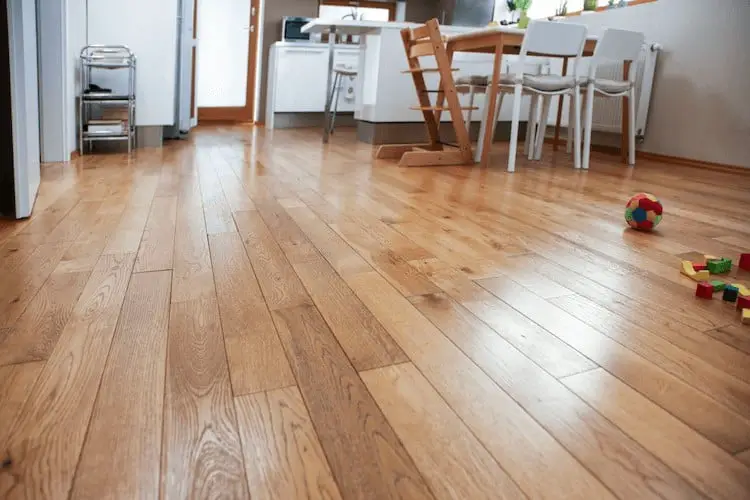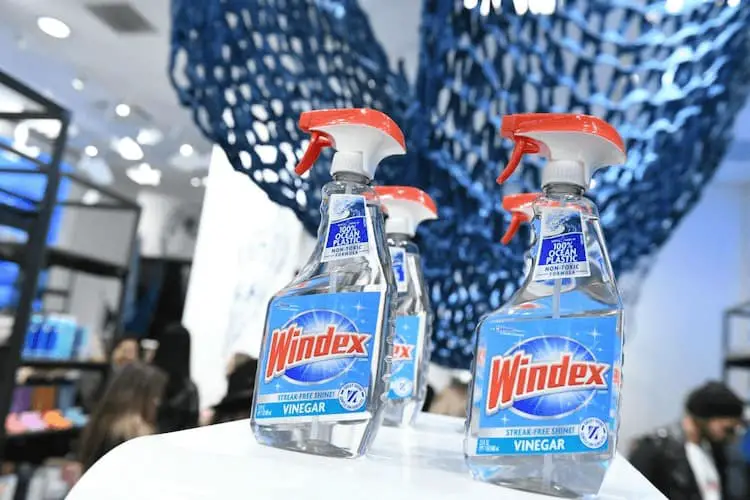Windex is the trademark for a glass cleaner which is also applied in other cleaning purposes. The manufacturer of Windex described Windex as a very effective cleaner for window glass and other hard surfaces. Using windex on hardwood floors is beneficial because it is a glass cleaning solution that has alcohol and ammonia as its main constituents. Ammonia is a wax-stripping agent; it is normally used to remove acrylic waxes on hardwood floors. When your floor is exposed to ammonia, it strips off the finish dry and makes the wood warp.
Many people have asked if they can use Windex on hardwood floors. A lot of people that have polyurethane-coated hardwood floors are using glass cleaners like Glass Plus and Windex to clean old hardwood floors. Apparently, a glass cleaner is not made for hardwood floors; it is designed specifically to clean glass. Notwithstanding, Windex has become used and known widely as a hardwood floor cleaner, with several positive feedbacks. Generally, glass cleaners have become popular for hardwood flooring applications.
A lot of commercial hardwood cleaning products use various oils and paraffin wax which are impervious to polyurethaned hardwood floors. These products create a pool on the surface of the hardwood floors because of their impermeability. Many of these household products claim to clean your hardwood floors but they end up making your floor look dirty and dull.
A common product that is used on sealed hardwood floors is Orange Glo. It is known to leave grimy residue on the floor and this has caused displeasure in many people. These oil-based hardwood floor cleaners can react with polyurethane coating of your hardwood floor and cause your floor to deplete. The oil will percolate into the wood and make it hard for future recoats to adhere well. That been said, when an oil soap gives you a cloudy floor, you should clean the floor immediately.
Can You Use Windex On Hardwood Floors?
Table of Contents
Yes, you can use windex on hardwood floors. This keeps you at an advantage because windex is a cheap and effective solution. To get rid of this grimy and filmy build-up on your hardwood floor, choose to use Windex. Below we’ve stated a better method on how to use windex on hardwood floors, keep reading.
How To Use Windex On Hardwood Floors

There are various ways in which Windex can be used on sealed hardwood floors. Not all of these cleaning methods are okay for the durability and longevity of your hardwood floor. One very common method is mixing Windex with warm water in a bucket.
Ideally, you shouldn’t be putting water on your hardwood floor. Even if the mop is just fairly damp, you will have to quickly dry the floor with a dry cloth or towel. If water is left on the floor, it can easily pass through small openings and seams on the finish and get absorbed by the hardwood. This will make your floor start twisting or warping. So, this method is not recommended if you care about the durability of your hardwood floor.
A better method to use Windex on hardwood floors is by spraying it on a microfiber mop. You shouldn’t spray Windex on hardwood floor directly; because you need to prevent liquid pools from forming on the floor. Once you have sprayed Windex on the microfiber mop, wipe the floor until it is completely dry. Do not use water at all; just Windex.
For spot cleaning, use a soft sponge instead of a microfiber mop. It will remove film and dust. Although some people effectively hand-scrub their floors with Windex, they expend a lot of energy doing it.
Many people have completely switched to using Windex on hardwood floors. This is okay, provided they don’t use it with water. Still and all, Windex should only be used for removing filmy residue. Don’t use an ammonia-based cleaner on your hardwood floor all the time; it has a detrimental effect on your floor in the long run. Most people also use pine sol on hardwood floors, this is another create cleaner for cleaning dirt and grease from hardwood floors.
Precautions to Take When Using Windex on Hardwood Floors
Windex can cause harsh eye and skin irritation. It can be ingested into the body via skin contact and/or inhalation. The effects could be shortness of breath, severe cough, a threatening respiratory issue or a sore throat. Prolonged skin contact with Windex can lead to redness, rash or burning sensation. Contact with the eye can cause burns and blurred vision. When you directly ingest Windex, you can experience vomiting and abdominal cramping.
Therefore, Windex should be used with great care to prevent direct body contact. When using Windex, always use protective gloves. Keep Windex away from children and pets. If you accidentally ingest Windex or it comes in contact with your skin or eyes, seek medical attention immediately.
Conclusion
Windex on hardwood floors should only be used to remove filmy residue. Adhering to this instruction will guarantee a durable and long-lasting hardwood floor in your home. Always use the appropriate cleaning methods and products to clean your hardwood floor.
Bad choice of a cleaning product can cause an irreversible damage on your hardwood floor and cost you time and money to replace it. A good cleaning product should be easy to use, safe on humans and pets and gentle on the floor. Regular cleaning is important for a long-lasting hardwood floor.
Have you used windex on hardwood floors before? Let us know how effective it was for you in the comments. A lot of people out there have been hesitant to use windex on hardwood floors, share this post to help them make a perfect decision.
